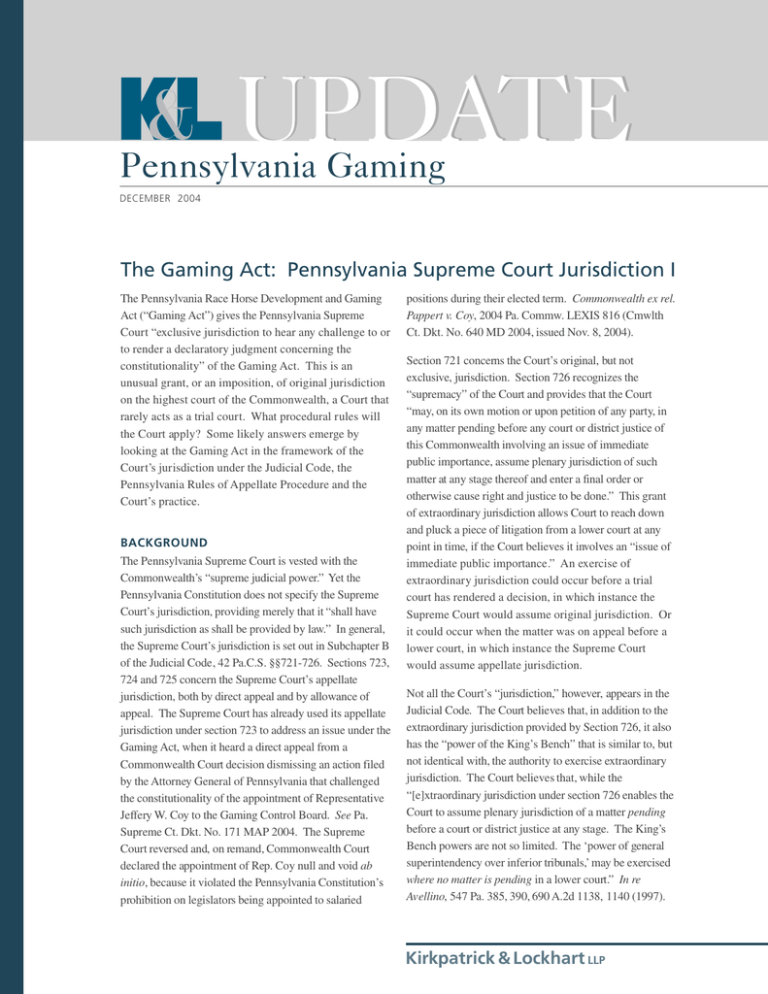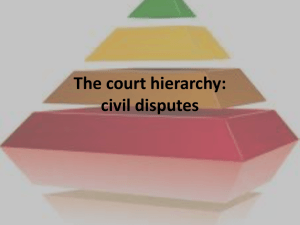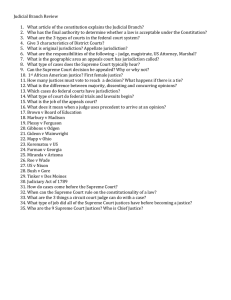
UPDATE
Pennsylvania Gaming
DECEMBER 2004
The Gaming Act: Pennsylvania Supreme Court Jurisdiction I
The Pennsylvania Race Horse Development and Gaming
Act (“Gaming Act”) gives the Pennsylvania Supreme
Court “exclusive jurisdiction to hear any challenge to or
to render a declaratory judgment concerning the
constitutionality” of the Gaming Act. This is an
unusual grant, or an imposition, of original jurisdiction
on the highest court of the Commonwealth, a Court that
rarely acts as a trial court. What procedural rules will
the Court apply? Some likely answers emerge by
looking at the Gaming Act in the framework of the
Court’s jurisdiction under the Judicial Code, the
Pennsylvania Rules of Appellate Procedure and the
Court’s practice.
BACKGROUND
The Pennsylvania Supreme Court is vested with the
Commonwealth’s “supreme judicial power.” Yet the
Pennsylvania Constitution does not specify the Supreme
Court’s jurisdiction, providing merely that it “shall have
such jurisdiction as shall be provided by law.” In general,
the Supreme Court’s jurisdiction is set out in Subchapter B
of the Judicial Code, 42 Pa.C.S. §§721-726. Sections 723,
724 and 725 concern the Supreme Court’s appellate
jurisdiction, both by direct appeal and by allowance of
appeal. The Supreme Court has already used its appellate
jurisdiction under section 723 to address an issue under the
Gaming Act, when it heard a direct appeal from a
Commonwealth Court decision dismissing an action filed
by the Attorney General of Pennsylvania that challenged
the constitutionality of the appointment of Representative
Jeffery W. Coy to the Gaming Control Board. See Pa.
Supreme Ct. Dkt. No. 171 MAP 2004. The Supreme
Court reversed and, on remand, Commonwealth Court
declared the appointment of Rep. Coy null and void ab
initio, because it violated the Pennsylvania Constitution’s
prohibition on legislators being appointed to salaried
positions during their elected term. Commonwealth ex rel.
Pappert v. Coy, 2004 Pa. Commw. LEXIS 816 (Cmwlth
Ct. Dkt. No. 640 MD 2004, issued Nov. 8, 2004).
Section 721 concerns the Court’s original, but not
exclusive, jurisdiction. Section 726 recognizes the
“supremacy” of the Court and provides that the Court
“may, on its own motion or upon petition of any party, in
any matter pending before any court or district justice of
this Commonwealth involving an issue of immediate
public importance, assume plenary jurisdiction of such
matter at any stage thereof and enter a final order or
otherwise cause right and justice to be done.” This grant
of extraordinary jurisdiction allows Court to reach down
and pluck a piece of litigation from a lower court at any
point in time, if the Court believes it involves an “issue of
immediate public importance.” An exercise of
extraordinary jurisdiction could occur before a trial
court has rendered a decision, in which instance the
Supreme Court would assume original jurisdiction. Or
it could occur when the matter was on appeal before a
lower court, in which instance the Supreme Court
would assume appellate jurisdiction.
Not all the Court’s “jurisdiction,” however, appears in the
Judicial Code. The Court believes that, in addition to the
extraordinary jurisdiction provided by Section 726, it also
has the “power of the King’s Bench” that is similar to, but
not identical with, the authority to exercise extraordinary
jurisdiction. The Court believes that, while the
“[e]xtraordinary jurisdiction under section 726 enables the
Court to assume plenary jurisdiction of a matter pending
before a court or district justice at any stage. The King’s
Bench powers are not so limited. The ‘power of general
superintendency over inferior tribunals,’ may be exercised
where no matter is pending in a lower court.” In re
Avellino, 547 Pa. 385, 390, 690 A.2d 1138, 1140 (1997).
Kirkpatrick & Lockhart LLP
And, at least one other statute besides the Gaming Act
gives the Supreme Court original jurisdiction over a
particular function of government. In Act No. 1998-46,
which amended the Public School Code, the Court was
provided “exclusive jurisdiction to hear any challenge to or
to render a declaratory judgment concerning the
constitutionality of sections 691(c) and 696 of the [Public
School Code] and issues related to collective bargaining
arising under these sections.” Sections 691(c) and 696 of
the Public School Code concern situations in which a
school district of the first class (i.e., Philadelphia) may be
declared to be distressed and how that school district
would be governed, if so declared. To date, the Court has
twice addressed challenges to the constitutionality of
sections 691(c) and 696 pursuant to its original jurisdiction
under Act 46. See Pa. Supreme Court Docket Nos. 153
EM 2001 and 202 EM 2002.
PROCEDURE TO FOLLOW
The practice and procedure to be followed by an appellate
court, like the Pennsylvania Supreme Court, when acting
in its original jurisdiction is addressed in Rule 106 of the
Pennsylvania Rules of Appellate Procedure. Rule 106
provides:
Unless otherwise prescribed by these rules the practice
and procedure in matters brought before an appellate court
in its original jurisdiction shall be in accordance with the
appropriate general rules applicable to practice and
procedure in the courts of common pleas, so far as they
may be applied.
One must not conclude, however, that this means the
practice and procedure to be followed can be discerned
merely by reference to the Pennsylvania Rules of Civil
Procedure. Rule 106 contains two traps – “unless
otherwise prescribed by these rules [i.e., the Rules of
Appellate Procedure]” and “so far as they [i.e., the Rules
of Civil Procedure] may be applied.”
The Rules of Appellate Procedure address the original
jurisdiction of appellate courts in Chapter 15. Problems
arise, though, because Chapter 15 concerns the “Petition
for Review” practice, which is used in both original and
appellate jurisdiction practice. Rule 1502 abolishes,
among others, “the actions of equity, replevin, mandamus
and quo warranto and the action for a declaratory
judgment … insofar as they relate to matters under this
chapter [15]” and requires that the “petition for review,
insofar as applicable under this chapter, shall be the
2
exclusive procedure for judicial review of a
governmental unit.” Rule 102 defines “governmental
unit” very broadly as:
The Governor, and the departments, boards, commissions,
officer s, authorities and other agencies of the
Commonwealth, including the General Assembly and its
officers and agencies and any court or other officer or agency
of the unified judicial system, and any political subdivision
or municipal or other local authority or any officer or agency
of any such political subdivision or local authority. …
The Gaming Control Board is the likely defendant in any
challenge to the constitutionality of the Gaming Act, and it
is a governmental unit as defined by Rule 102.
Accordingly, Chapter 15 and “petition for review”
procedures are potentially applicable. Yet complications
arise because Chapter 15 and the “petition for review”
procedure also apply to what would otherwise be called
“appeals” from decisions of agencies of the
Commonwealth, such as the Department of Public Welfare,
the Unemployment Compensation Board of Review, the
Workers’ Compensation Board of Review, the Board of
Probation and Parole, and many, many others.
Chapter 15 addresses such things as what must be covered
in the Petition for Review (Rule 1513), how it is to be filed
and served (Rule 1514), how it is to be answered (Rule
1515), what other pleadings are allowed (Rule 1516) and
jury trials (Rule 1543). While Chapter 15 addresses
intervention in petitions for review in the nature of an
appeal (Rule 1531), it does not address intervention with
respect to original jurisdiction actions, requiring a litigant to
turn to the Rules of Civil Procedure to determine how one
might intervene. Care must be taken in parsing Chapter 15
to determine which rules apply to original jurisdiction
actions and when resort to the Rules of Civil Procedure is
required.
There are also appellate rules outside of Chapter 15 that
may apply to original jurisdiction matters. For example,
Rule 531 addresses participation by amicus curiae. Rule
531 permits “[a]nyone interested in any matter pending in
an appellate court, excluding Petitions for Allowance of
Appeal, although not a party [] without applying for leave to
do so, [to] file a brief amicus curiae in regard to those
questions.” Commonwealth Court allows such participation
in original jurisdiction matters. See, e.g., Commonwealth ex
rel. Pappert v. Coy, 2004 Pa. Commw. LEXIS 816
(overruling preliminary objections and granting application
for special and summary relief in nature of a declaratory
judgment and noting briefs of amici).
KIRKPATRICK & LOCKHART LLP PENNSYLVANIA GAMING UPDATE
One would therefore expect the Supreme Court in
challenges to the constitutionality of the Gaming Act to
apply Chapter 15 of the Rules of Appellate Procedure and
to proceed in a fashion similar to Commonwealth Court.
But this would not be a safe assumption.
In addressing the original jurisdiction matters that arose
under Act No. 1998-46, the Supreme Court did not follow
Chapter 15 of the Rules of Appellate Procedure. Instead,
it turned to the Rules of Civil Procedure. This may have
been because Act 46, unlike the Gaming Act, not only
provided the Supreme Court with original jurisdiction of
certain claims but also gave it carte blanche on practice
and procedure by providing: “The Supreme Court is
authorized to take such action as it deems appropriate,
consistent with the Supreme Court retaining jurisdiction
over such a matter, to find facts or to expedite a final
judgment in connection with such a challenge or request
for declaratory judgment.”
It is not unusual for the Supreme Court, when it assumes
extraordinary jurisdiction of a matter, to appoint a judge of
a lower court, or the lower court itself from which it took
K&L serves a dynamic and growing clientele in regional, national
and international markets that includes representation of over half
of the FORTUNE 100. Currently approximately 800 lawyers
strong, K&L’s practice embraces three major areas—litigation,
corporate and regulatory and related fields. On January 1, 2005,
K&L will combine with the English firm Nicholson Graham &
Jones. Once the combination is finalized, Kirkpatrick & Lockhart
Nicholson Graham, as the firm will then be named, will have
approximately 950 lawyers located in London and ten U.S. cities,
including Boston, Dallas, Harrisburg, Los Angeles, Miami,
Newark, New York, Pittsburgh, San Francisco and Washington,
D.C. For more information, visit K&L’s web site at: www.kl.com,
or Nicholson Graham & Jones’ web site at www.ngj.co.uk.
jurisdiction, to hear evidence and to propose findings of
fact and conclusions of law. For example, in Erfer v.
Commonwealth, 568 Pa. 128, 794 A.2d 325 (2002), the
Court, on January 25, 2002, granted an application
requesting that it assume extraordinary jurisdiction of
certain challenges to Pennsylvania’s recently enacted
congressional redistricting plan. The Court then directed
Commonwealth Court to provide it with findings of fact
and conclusions of law by February 8, 2002. As
requested, Commonwealth Court held a hearing and
submitted to the Court recommended findings of fact and
conclusions of law and an opinion. The Supreme Court
may well use a similar procedure to handle any Gaming
Act suits that require findings of fact.
CONCLUSION
While the resolution of challenges to the constitutionality
of the Gaming Act is the responsibility of the Pennsylvania
Supreme Court, the procedure that the Court will follow is
not obvious. Chapter 15 of the Rules of Appellate
Procedure would seem to be the place to start but is not
all-encompassing. If there are material issues of fact, the
Court might well assign the case to a master or to another
court for hearing. However, if the challenge is facial, or if
the material facts are judicially noticeable, applications for
summary relief under Chapter 15 of the Rules of Appellate
Procedure or judgment on the pleadings under the Rules of
Civil Procedure would likely be accepted. Parties wishing
to attack or to defend the constitutionality of the Gaming
Act would be wise to familiarize themselves with the
Supreme Court’s prior cases in which it exercised
extraordinary or original jurisdiction.
LINDA J. SHOREY
lshorey@kl.com
717.231.4510
FOR MORE INFORMATION, please consult one of the
lawyers listed below:
JOHN P. KRILL, JR.
Harrisburg
David R. Overstreet
C. Grainger Bowman
717.231.4517
717.231.5817
doverstreet@kl.com
gbowman@kl.com
Pittsburgh
Sandy B. Ferguson
412.355.6494
sferguson@kl.com
jkrill@kl.com
717.231.4505
The attorneys resident in all offices, unless otherwise indicated,
are not certified by the Texas Board of Legal Specialization.
®
Kirkpatrick & Lockhart LLP
Challenge us. ®
www.kl.com
BOSTON
■
DALLAS
■
HARRISBURG
■
LOS ANGELES
■
MIAMI
■
NEWARK
■
NEW YORK
■
PITTSBURGH
■
SAN FRANCISCO
■
WASHINGTON
.........................................................................................................................................................
This publication/newsletter is for informational purposes and does not contain or convey legal advice. The information herein
should not be used or relied upon in regard to any particular facts or circumstances without first consulting a lawyer.
DECEMBER 2004
© 2004 KIRKPATRICK & LOCKHART LLP.
ALL RIGHTS RESERVED.
Kirkpatrick & Lockhart LLP
75 State Street
Boston, Massachusetts 02109
617.261.3100 PHONE
617.261.3175 FAX
2828 North Harwood Street
Suite 1800
Dallas, Texas 75201
214.939.4900 PHONE
214.939.4949 FAX
Payne Shoemaker Building
240 North Third Street
Harrisburg, Pennsylvania 17101
717.231.4500 PHONE
717.231.4501 FAX
10100 Santa Monica Boulevard
Seventh Floor
Los Angeles, California 90067
310.552.5000 PHONE
310.552.5001 FAX
Miami Center - 20th Floor
201 South Biscayne Boulevard
Miami, Florida 33131
305.539.3300 PHONE
305.358.7095 FAX
One Newark Center, Tenth Floor
Newark, New Jersey 07102
973.848.4000 PHONE
973.848.4001 FAX
599 LexingtonAvenue
New York, New York 10022
212.536.3900 PHONE
212.536.3901 FAX
Henry W. Oliver Building
535 Smithfield Street
Pittsburgh, Pennsylvania 15222
412.355.6500 PHONE
412.355.6501 FAX
Four Embarcadero Center, 10th Floor
San Francisco, California 94111
415.249.1000 PHONE
415.249.1001 FAX
1800 Massachusetts Avenue, N.W.
Second Floor
Washington, DC 20036
202.778.9000 PHONE
202.778.9100 FAX
®
www.kl.com
Kirkpatrick & Lockhart LLP
Challenge us.
®





